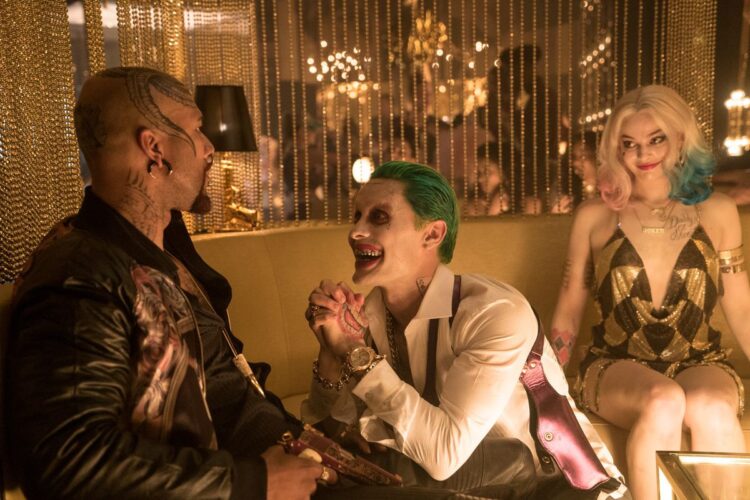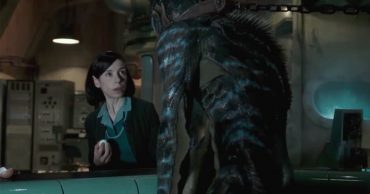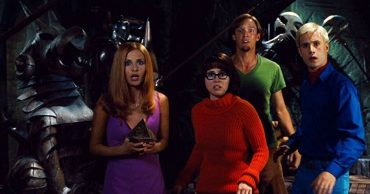It’s been seven years and David Ayer’s Suicide Squad is still a hot topic in pop culture. The director hasn’t been quiet since the backlash he received over the misfire that he released in 2016. Suicide Squad was a huge financial hit, but most DCEU fans would agree that the film is one of the worst entries in the DCEU canon. However, one of the biggest talking points about Ayer’s release was Jared Leto‘s Joker.
Despite being heavily advertised for the film, Joker wasn’t the main villain of the feature and fans took issue with that. Leto’s version of the DC icon is easily the most divisive out of all of the incarnations. Most haters and non-haters will agree one thing about Joker – that the damaged tattoo on his forehead was a terrible idea. Even the director himself has come out and stated he wishes he could take back ever giving Joker that tattoo in the first place. With all the buzz about Suicide Squad going on, was the damaged tattoo really that bad? Or was the pile of hate unwarranted?
The Damaged Tattoo Made Joker Come Across As A Cartoon Villain

The biggest notion about a villain is that they’re not supposed to know that they’re the bad guys. No matter what their twisted vision of the world is, a villain is always supposed to believe that they’re the hero of their own story. For example, Joker in The Dark Knight believed that everyone in Gotham was just like him – animals who reveled in chaos. Or The Riddler in The Batman, who was targeting the corrupt elites and the crime boss that put them in power.
They’re written as complex beings that challenge the morality of life and characters within this world. Giving Joker a damaged tattoo shatters that illusion. Joker is not supposed to know that he’s a villain. No matter how crazy or illogical the character gets, he should be the hero in his own mind.
Joker isn’t given much dimension beyond psychopath in Suicide Squad. Sure, there was that one redeeming moment when he jumped in the acid with Haley Quinn. However, there’s rarely a gray area that truly humanizes him as a character. Ultimately, the writing is what did Jared Leto’s version in, but that damaged tattoo made it unbelievable that Joker was anything other than a cartoon villain.
The Tattoo Could’ve Been An Interesting Layer About Joker’s Past

On the flip side, that damaged tattoo could’ve been an interesting nugget that hides a tragic secret about Joker’s past. Joker isn’t supposed to know that he’s a villain, but that doesn’t mean he can’t have a conscience. If Ayer wrote a compelling backstory that warrants the damaged tattoo then it could be justifiable why it exists in the first place.
There are numerous origin stories that recall Joker’s tragic past. The main one is that the character is a criminal who fell into a vat of acid. However, The Killing Joke had a series of events that led to the death of his wife. Or even Arthur Fleck (Todd Phillips Joker), who’s a mentally ill man who’s getting no love from the system and is consistently bullied. There are plenty of ways to bring out dimension with just that tattoo.
The problem is, Suicide Squad is not about Joker’s past. His arc is mainly about his love for Harley Quinn. Since there’s never even a reference on what the damaged tattoo really means, it’s hard to see a positive on why it exists in the first place. Joker was simply a generic gangster who ran rough-shot around Gotham. Perhaps the sequel was supposed to go deeper into the psyche of said character, but clearly, Ayer’s version of Joker is dead and gone.
Was The Damaged Tattoo A Mistake?

Yes. There are interesting possibilities on why Joker got the tattoo in the first place. But as previously mentioned, Suicide Squad is not about Joker or his backstory. It doesn’t go beyond what Ayer showcased, so it was hard to take him seriously because his character came across as cartoonish. Zack Snyder‘s brief cameo in Jared Leto’s Joker highlighted just how great the actor could’ve been in the role, but sadly, Joker was weighed down by forces beyond his control.
 Follow Us
Follow Us





